江科大中澳班国际商法复习
国际商法复习题

国际商法复习题国际商法复习题导言:国际商法是指跨国商业交易中适用的法律规则和原则。
在全球化的背景下,国际商法的重要性日益凸显。
本文将通过一些复习题来回顾国际商法的基本概念和原则。
一、国际商法的定义和特点国际商法是指适用于跨国商业交易的法律规则和原则。
它具有以下特点:1. 跨越国界:国际商法适用于跨国交易,涉及多个国家的法律体系。
2. 自主性:当事人可以选择适用的法律,如国际公约、国际商会制定的规则等。
3. 合同自由原则:国际商法强调当事人的自主权,允许当事人通过合同自由约定权利和义务。
4. 国家主权原则:国际商法尊重国家主权,不干涉国家内部事务。
二、国际商法的主要规则和机构1. 联合国国际货物销售合同公约(CISG):CISG是适用于跨国货物销售合同的最重要的国际公约之一。
2. 国际商会(ICC):ICC是一个非政府组织,致力于促进国际商业交流和解决商业争议。
3. 仲裁机构:国际商业争议的解决通常采用仲裁方式,如国际商会仲裁院、国际中心仲裁机构等。
三、国际商法中的合同法原则1. 诚实信用原则:合同当事人应当诚实守信,遵守合同义务。
2. 自主原则:当事人享有合同自由,可以自由约定合同条款。
3. 无效原则:合同无效的情况包括欺诈、威胁、重大误解等。
4. 履行原则:当事人应当按照合同约定履行义务,包括交付货物、支付货款等。
5. 不可抗力原则:当不可抗力事件发生时,当事人可以免除或暂缓履行合同义务。
四、国际商法中的争议解决机制1. 仲裁:仲裁是国际商业争议解决的常用方式,具有快速、灵活、保密等优势。
2. 法院诉讼:当事人也可以选择向国际法院提起诉讼,但这通常是较为耗时和昂贵的方式。
3. 调解和协商:在国际商事争议中,调解和协商也是常用的解决方式,可以帮助当事人达成和解。
五、国际商法中的知识产权保护知识产权保护在国际商法中具有重要意义。
当事人在跨国交易中应注意以下问题:1. 注册:在涉及知识产权的交易中,当事人应及时进行相关知识产权的注册,以保护自身权益。
国际商法全面复习资料
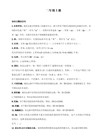
A、郡法院:民事案件。不服可向王座、王冠法庭上诉。
B、治安法院:轻微犯罪行为的案件
注:英国无独立的行政法院,不设检察官制度。
英美(普通)法系之美国法
1、结构及特点:①属普通法系,以判例法作为法的主要渊源,成文法是对判例法的补充或修正;②采用英国法的范畴、概念和分类方法,也存在普通法与衡平法的区别; ③由于美国是联邦制国家,在结构上美国法律既包括联邦法,也包括州法。
但制订了一些有关某种具体合同的成文法,如英国〈1893年货物买卖法〉美国1906年〈统一买卖法〉。
(二)中国法:〈中华人民共和国合同法〉1999年10月1日起施行。此外,中国加入WTO之后,有关外资的合同法将进行清理和修订。
合同:是平等主体的自然人、法人、其他组织之间设立、变更、终止民事权利义务关系的协议。不包括婚姻、收养、监护等有关身份关系的协议。
1、结构及特点:①二元性结构,分普通法与衡平法,②重视程序法。
2、渊源:①判例法;②成文法;③习惯(1189年时已存)
3、法院组织:
高等法院
A、高级法院:(1)王座法庭:海事法庭/商事法庭;(2)枢密大臣法庭:公司法庭/破产法庭(3)亲属法庭
B、王冠法院:刑事案件
C、上诉法院:是高等法院内的第二级审判机关,如不服判决可向上议院上诉委员会提出上诉。
国际商法的渊源,主要是指国际商事法产生的依据及其表现形式,它包括:国际(商务)条约、国际(商事)惯例和各国商事立法。
中国法律的渊源
(一)制定法:具有立法权的国家机关依照一定程序以条文形式制定和颁布实施的法律,也称成文法。我国的成文法表现为:
1、宪法;2、法律;3、行政法规;4、地方性法规;5、行政规章;6、特别行政区的法律
国际商法考试复习提纲
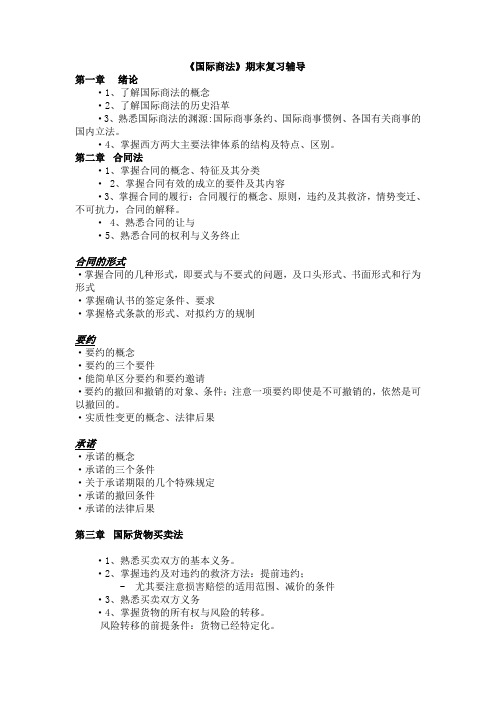
《国际商法》期末复习辅导第一章绪论·1、了解国际商法的概念·2、了解国际商法的历史沿革·3、熟悉国际商法的渊源:国际商事条约、国际商事惯例、各国有关商事的国内立法。
·4、掌握西方两大主要法律体系的结构及特点、区别。
第二章合同法·1、掌握合同的概念、特征及其分类· 2、掌握合同有效的成立的要件及其内容·3、掌握合同的履行:合同履行的概念、原则,违约及其救济,情势变迁、不可抗力,合同的解释。
· 4、熟悉合同的让与·5、熟悉合同的权利与义务终止合同的形式·掌握合同的几种形式,即要式与不要式的问题,及口头形式、书面形式和行为形式·掌握确认书的签定条件、要求·掌握格式条款的形式、对拟约方的规制要约·要约的概念·要约的三个要件·能简单区分要约和要约邀请·要约的撤回和撤销的对象、条件;注意一项要约即使是不可撤销的,依然是可以撤回的。
·实质性变更的概念、法律后果承诺·承诺的概念·承诺的三个条件·关于承诺期限的几个特殊规定·承诺的撤回条件·承诺的法律后果第三章国际货物买卖法·1、熟悉买卖双方的基本义务。
·2、掌握违约及对违约的救济方法:提前违约;- 尤其要注意损害赔偿的适用范围、减价的条件·3、熟悉买卖双方义务·4、掌握货物的所有权与风险的转移。
风险转移的前提条件:货物已经特定化。
违约·违约的两个分类·根本违约的概念、条件、法律后果(赋予守约方宣告合同无效的权利)·预期违约的概念、原因、法律后果及具体应用(注意担保不充分的考点)·违约免责中的不可抗力(重点要注意不可抗力的法律后果,及免责的前提条件)第四章票据法·1、熟悉票据法的含义,掌握各国票据立法上的差异。
国际商法复习重点.doc
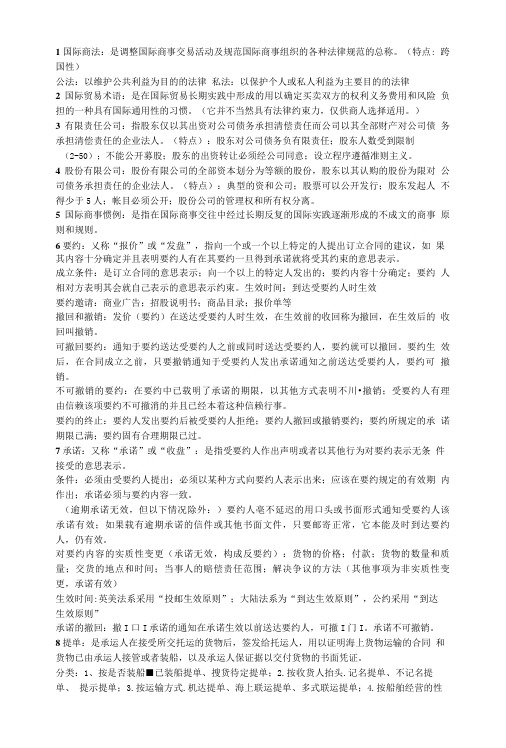
1国际商法:是调整国际商事交易活动及规范国际商事组织的各种法律规范的总称。
(特点: 跨国性)公法:以维护公共利益为目的的法律私法:以保护个人或私人利益为主要目的的法律2国际贸易术语:是在国际贸易长期实践中形成的用以确定买卖双方的权利义务费用和风险负担的一种具有国际通用性的习惯。
(它并不当然具有法律约束力,仅供商人选择适用。
)3有限责任公司:指股东仅以其出资对公司债务承担清偿责任而公司以其全部财产对公司债务承担清偿责任的企业法人。
(特点):股东对公司债务负有限责任;股东人数受到限制(2-50);不能公开募股;股东的出资转让必须经公司同意;设立程序遵循准则主义。
4股份有限公司:股份有限公司的全部资本划分为等额的股份,股东以其认购的股份为限对公司债务承担责任的企业法人。
(特点):典型的资和公司;股票可以公开发行;股东发起人不得少于5人;帐目必须公开;股份公司的管理权和所有权分离。
5国际商事惯例:是指在国际商事交往中经过长期反复的国际实践逐渐形成的不成文的商事原则和规则。
6要约:乂称“报价”或“发盘”,指向一个或一个以上特定的人提出订立合同的建议,如果其内容十分确定并且表明要约人有在其要约一旦得到承诺就将受其约束的意思表示。
成立条件:是订立合同的意思表示;向一个以上的特定人发出的;要约内容十分确定;要约人相对方表明其会就自己表示的意思表示约束。
生效时间:到达受要约人时生效要约邀请:商业广告;招股说明书;商品目录;报价单等撤回和撤销:发价(要约)在送达受要约人时生效,在生效前的收回称为撤回,在生效后的收回叫撤销。
可撤回要约:通知于要约送达受要约人之前或同时送达受要约人,要约就可以撤回。
要约生效后,在合同成立之前,只要撤销通知于受要约人发出承诺通知之前送达受要约人,要约可撤销。
不可撤销的要约:在要约中已载明了承诺的期限,以其他方式表明不川•撤销;受要约人有理由信赖该项要约不可撤消的并且已经本着这种信赖行事。
国际商法复习资料
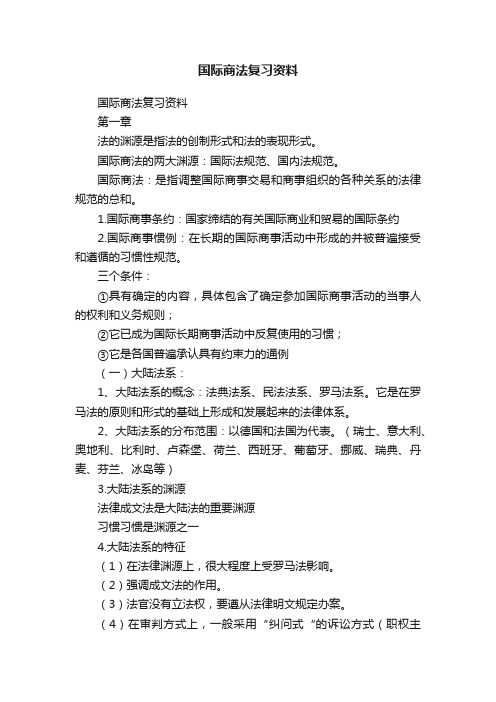
国际商法复习资料国际商法复习资料第一章法的渊源是指法的创制形式和法的表现形式。
国际商法的两大渊源:国际法规范、国内法规范。
国际商法:是指调整国际商事交易和商事组织的各种关系的法律规范的总和。
1.国际商事条约:国家缔结的有关国际商业和贸易的国际条约2.国际商事惯例:在长期的国际商事活动中形成的并被普遍接受和遵循的习惯性规范。
三个条件:①具有确定的内容,具体包含了确定参加国际商事活动的当事人的权利和义务规则;②它已成为国际长期商事活动中反复使用的习惯;③它是各国普遍承认具有约束力的通例(一)大陆法系:1、大陆法系的概念:法典法系、民法法系、罗马法系。
它是在罗马法的原则和形式的基础上形成和发展起来的法律体系。
2、大陆法系的分布范围:以德国和法国为代表。
(瑞士、意大利、奥地利、比利时、卢森堡、荷兰、西班牙、葡萄牙、挪威、瑞典、丹麦、芬兰、冰岛等)3.大陆法系的渊源法律成文法是大陆法的重要渊源习惯习惯是渊源之一4.大陆法系的特征(1)在法律渊源上,很大程度上受罗马法影响。
(2)强调成文法的作用。
(3)法官没有立法权,要遵从法律明文规定办案。
(4)在审判方式上,一般采用“纠问式“的诉讼方式(职权主义)。
(5)在法律的推理形式和方法上,采取演绎法。
成文法:又称制定法,它是国家立法机构依照律法程序制定,并经一定形式公布施行的条文形式的法律。
在法律结构上强调系统化、条理化、法典化、逻辑性。
(二)英美法系1、英美法系的概念:又称普通法,是以英国中世纪形成的普通法为基础发展起来,以后扩展到美国及其他过去曾受英国殖民统治的国家和地区的西方国家法律的总称。
2、英美法系的分布范围:普通法系形成于英国,以后扩展到美国及过去曾受英国殖民地统治的国家和地区,主要包括加拿大、澳大利亚、新西兰、爱尔兰、印度、巴基斯坦、马来西亚和新加坡,中国香港。
(南非、斯里兰卡、菲律宾——混合)(联合王国的苏格兰、美国的路易斯安娜州和加拿大的魁北克属于大陆法系。
国际商法复习刚要1-8章(删节版)

注意:这些都只是根据我自己的疑问来问老师的,所以有些地方没问到,不考的地方我已经删除,若对有些知识点不明白,自己去问老师补充:FOB FCA CFR CIF CPT CIP第一章国际商法概述(了解)一、国际商法的渊源,主要是:国际条约和国际惯例,其中国际条约占有重要地位;(一)国际商事条约1.概念:是两个或两个以上的国家或国际组织共同缔结的确定其相互关系中有关商事权利义务的各种协议。
2.条约必须遵守;条约仅对缔约国有效;(二)国际商事惯例3.国际惯例的概念:是在长期反复的国际商事交往实践中逐步形成,并得到各国普遍承认或遵守的商事活动的习惯做法,由此成为公认的国际商事原则或规则。
4.国际条约和国际惯例的区别(1)形成方式不同:条约由国际法主体资格的国家或国际组织制定或认可,而惯例是国际商事交往中通过实践形成的习惯性做法,只不过这种做法得到了各国普遍承认和自愿遵守。
(2)效力不同:条约对缔约国当然生效,保留条款除外;而国际惯例的适用必须得到当事人的选择,当事人不选择,惯例不适用。
二、大陆法系与英美法系1.大陆法系的概念及特征2.英美法系的概念及特征3.大陆法系和英美法系的区别第二章国际商事合同法一、合同的概念、特征及原则(了解)二、合同的订立(一)要约1.要约的概念要约,又称为发盘、发价或报价等。
“要约是希望和他人订立合同的意思表示”。
可见要约是指一方当事人以缔结合同为目的,向对方当事人所作的意思表示。
发出要约的人称为要约人,接受要约的人则称为受要约人或相对人。
2.要约的成立要件(一)要约人是由具有订约能力的特定人作出的意思表示。
(二)要约必须具有订立合同的意图。
(三)要约应当向特定的相对人发出。
(四)要约的内容必须具体确定。
3.要约与要约邀请的区别要约邀请又称为要约引诱,是指希望他人向自己发出要约的意思表示。
要约邀请是当事人订立合同的预备行为,在发出要约邀请时,当事人仍处于订约的准备阶段,其目的在于引诱他人向自己发出要约,其内容往往是不明确、不具体的,其相对人是不特定的,所以,要约邀请不具有要约的约束力,发出要约邀请的人不受其约束。
国际商法期末复习_名词解释+案例
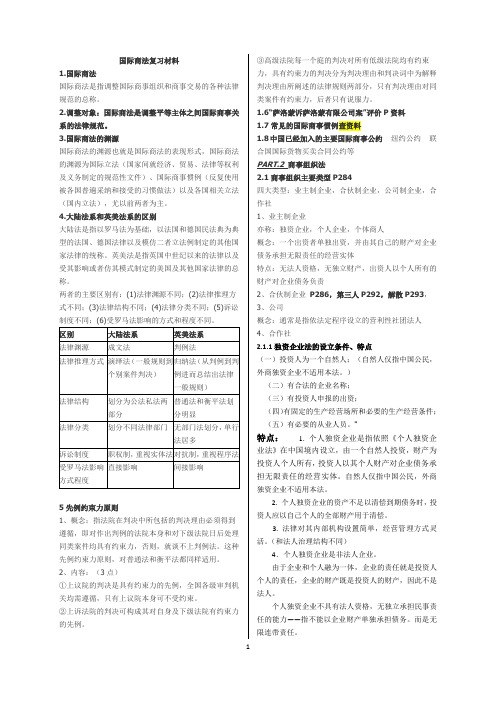
国际商法复习材料1.国际商法国际商法是指调整国际商事组织和商事交易的各种法律规范的总称。
2.调整对象:国际商法是调整平等主体之间国际商事关系的法律规范。
3.国际商法的渊源国际商法的渊源也就是国际商法的表现形式,国际商法的渊源为国际立法(国家间就经济、贸易、法律等权利及义务制定的规范性文件)、国际商事惯例(反复使用被各国普遍采纳和接受的习惯做法)以及各国相关立法(国内立法),尤以前两者为主。
4.大陆法系和英美法系的区别大陆法是指以罗马法为基础,以法国和德国民法典为典型的法国、德国法律以及模仿二者立法例制定的其他国家法律的统称。
英美法是指英国中世纪以来的法律以及受其影响或者仿其模式制定的美国及其他国家法律的总称。
两者的主要区别有:(1)法律渊源不同;(2)法律推理方式不同;(3)法律结构不同;(4)法律分类不同;(5)诉讼制度不同;(6)受罗马法影响的方式和程度不同。
5先例约束力原则1、概念:指法院在判决中所包括的判决理由必须得到遵循,即对作出判例的法院本身和对下级法院日后处理同类案件均具有约束力,否则,就谈不上判例法。
这种先例约束力原则,对普通法和衡平法都同样适用。
2、内容:(3点)①上议院的判决是具有约束力的先例,全国各级审判机关均需遵循,只有上议院本身可不受约束。
②上诉法院的判决可构成其对自身及下级法院有约束力的先例。
③高级法院每一个庭的判决对所有低级法院均有约束力,具有约束力的判决分为判决理由和判决词中为解释判决理由所阐述的法律规则两部分,只有判决理由对同类案件有约束力,后者只有说服力。
1.6“萨洛蒙诉萨洛蒙有限公司案”评价P资料1.7常见的国际商事惯例查资料1.8中国已经加入的主要国际商事公约纽约公约联合国国际货物买卖合同公约等PART.2 商事组织法2.1商事组织主要类型P284四大类型:业主制企业,合伙制企业,公司制企业,合作社1、业主制企业亦称:独资企业,个人企业,个体商人概念:一个出资者单独出资,并由其自己的财产对企业债务承担无限责任的经营实体特点:无法人资格,无独立财产,出资人以个人所有的财产对企业债务负责2、合伙制企业P286,第三人P292,解散P293,3、公司概念:通常是指依法定程序设立的营利性社团法人4、合作社2.1.1独资企业法的设立条件、特点(一)投资人为一个自然人;(自然人仅指中国公民,外商独资企业不适用本法。
国际商法期末复习整理
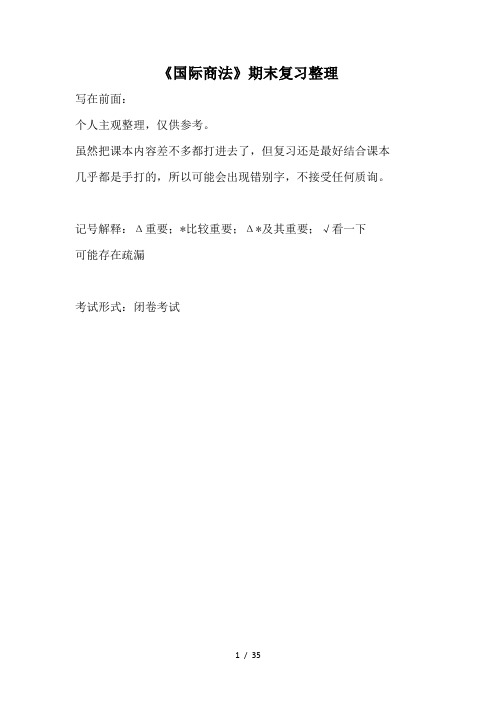
《国际商法》期末复习整理写在前面:个人主观整理,仅供参考。
虽然把课本内容差不多都打进去了,但复习还是最好结合课本几乎都是手打的,所以可能会出现错别字,不接受任何质询。
记号解释:Δ重要;*比较重要;Δ*及其重要;√看一下可能存在疏漏考试形式:闭卷考试第一章国际商法总论第一节国际商法概述一、国际商法的概念及其特征Δ1.国际商法是在指调整国际商事交易主体在其交易过程中所形成的各类商事法律关系的法律规范的总称。
2.这一概念涉及以下三项要素:①国际商法的调整对象和范围是国际商事交易活动中形成的各类商事法律关系;②国际商事交易的主体,包括个人、合伙、公司等商事组织形式;③国际商法有规范国际商事交易活动的国际条约、国际商事交易习惯法规则、主要国家的国内商事法律规范等构成。
3.国际商法的特征:①调整对象的特定性;②商事主体及商行为的盈利性;③商法规范的技术性和同源性;④国际性和统一性。
二、国际商法的渊源Δ商法的渊源是指商法规范的具体表现形式。
国际商法有两类渊源:①与国际商事交易活动相关的国际条约和习惯法规则;②对国际商事交易行为具有约束力的国内法规范,包括成文法、判例法、习惯法和学说。
1.国际条约或公约国际条约或公约是国际法主体之间就商事交易等方面确定其相互权利与义务而缔结的书面协议,是国际商法的主要表现形式。
1)其特征是:①主体是国家或类似于国家的政治实体,国家与自然人、法人及其他实体间就商事活动达成的协议不构成条约;②国际条约或公约是缔约主体双方或多方协商谈判的结果;③书面形式,仅对缔约国或参加国具有约束力,实践中可能得到非缔约国的承认和遵守。
2)包括国际商事公约和含有商事条款的一般国际公约,以前者为主,其数量众多、内容广泛且通常参加方较为普遍,包括国际商事实体法、国际商事程序法以及国际商事冲突法。
2.国际习惯法规则国际习惯法规则又称国际商事习惯法规则,是在国际商事交往过程中,由长期、反复的国际实践活动逐步形成并为各国普遍承认和遵守的国际商事交易行为规范。
- 1、下载文档前请自行甄别文档内容的完整性,平台不提供额外的编辑、内容补充、找答案等附加服务。
- 2、"仅部分预览"的文档,不可在线预览部分如存在完整性等问题,可反馈申请退款(可完整预览的文档不适用该条件!)。
- 3、如文档侵犯您的权益,请联系客服反馈,我们会尽快为您处理(人工客服工作时间:9:00-18:30)。
PART AThis part is compulsory. It contains 5 (five) questions. Y ou are required to answer each of the questions. Each question is worth six marks. Y ou are required to write down your right answers on your examination paper.1. Describe choices for parties in an arbitration2. Describe protectionist measures besides tariffs3. Describe methods of international commercial dispute settlement4. Describe TRIPS5.Describe coverage of UNIDROIT Principles6. Why is domestic contract law relevant where to international sales contracts where both buyer and seller’s countries are contracting parties to the Convention on the International Sale of Goods 1980 (CISG)?7. In relation to the international carriage of goods, explain what is meant by ‘the amended Hague Rules’ and where they are to be found. Do they apply in China? Do they apply in Australia?8. Describe WTO dispute resolution9. Describe CISG10. Describe Bills of Lading and their FunctionsPART BThis part is compulsory. It contains 10 (ten) short items. Y ou are required to answer each part of this question. Each item is worth three marks. Y ou are required to circle your right answers on your examination paper.1. The customs deductive value is based on the price actually paid for the greatest number of units sold to related persons in the importing country at about the same time.True/False2.A service mark is a mark used in the sale or advertising of services to identifythe services of one person and distinguish them from the services of another.True/False3.The difference between the national multinational enterprise and the internationalmultinational enterprise is that the international multinational enterprise has two or more parent companies located in different states.True/False4. Safeguards are regular actions that a WTO member state may take to protect its domesticindustries from serious injury from a sudden increase in the quantity of an importedproduct.True/False5. A patent is a statutory privilege granted by the government to inventors, and to othersderiving their rights from the inventor, for unfixed period of years, to exclude other persons from manufacturing, using, or selling a patented product or from utilizing a patented method or process. T rue/False6. A license is a nonexclusive revocable privilege that allows a licensee to use a licensor’sproperty.True/False7. Foreign investors are required to supply screening agencies with quite detailed informationabout their proposals. This include : the proposed location of the industryTrue/False8. CISG applies to contracts for the national sale of goods.True/False9. A bill of lading is an instrument issued by an ocean carrier to a shipper w ith whom thecarrier has entered into a contract for the carriage of goods.True/False10. Only the Hague Rules exempt carriers from liability from damages that arisefrom any Act of war.True/False11. The Hamburg Rules relating to sea carriage documents for international carriage of goods will apply in the following situation: A bill of lading is issued for a carriage of goods between a port in Eastasia and the port of Melbourne, Australia. Eastasia is not a signatory to, and does not give effect to, either the 1924 Brussels Convention or the Hamburg convention.True/False12.The Appellate body in WTO is an appeals board made up of seven persons. The term ofoffice is four years, renewable once.True/False13.The difference between the national multinational enterprise and the internationalmultinational enterprise is that the international multinational enterprise has two or more parent companies located in different states.True/False14. Safeguards are regular actions that a WTO member state may take to protect its domesticindustries from serious injury from a sudden increase in the quantity of an importedproduct.True/False15. A patent is a statutory privilege granted by the government to inventors, and to others deriving their rights from the inventor, for unfixed period of years, to exclude other persons from manufacturing, using, or selling a patented product or from utilizing a patented method or process. T rue/False16. A licens e is a nonexclusive revocable privilege that allows a licensee to use a licensor’sproperty.True/False17. Foreign investors are required to supply screening agencies with quite detailedinformation about their proposals. This include : the proposed location of the industryTrue/False18. CISG applies to contracts for the national sale of goods.True/False19. A bill of lading is an instrument issued by an ocean carrier to a shipper with whom thecarrier has entered into a contract for the carriage of goods.True/False20. A maritime lien is a charge or claim against a vessel, its freight, or its cargo.True/FalsePART C:This part is compulsory. It contains two cases. Y ou are required to attempt all of the two cases. Each case carries twenty marks. Y ou are required to write down your answers on your examination paper.Case 1US ruling on solar panels 'unreasonableUpdated: 2012-05-19 09:16By Du Juan and Ding Qingf en in Beijing and Zhang Yuwei in N ew York ( C hina Daily)China on Friday rejected a US anti-dumping ruling against Chinese solar power equipment, calling it "unfair" and "unreasonable", as Chinese manufacturers warned that possible higher tariffs might hurt efforts to promote clean energy.Shen Danyang, spokesman for the Ministry of Commerce, condemned the US anti-dumping tariffs as trade protectionism."By deliberately provoking trade friction in the clean energy sector, the United States is sending the world a negative signal about trade protectionism," Shen said in a statement.The two governments have pledged to cooperate in developing renewable energy but have accused each other of violating free-trade pledges by subsidizing their own manufacturers.Thursday's preliminary ruling by the US Department of Commerce said Chinese producers sold solar cells and panels below fair price and hurt American producers. If that ruling is upheld, tariffs averaging 31 percent could be imposed on Chinese solar-panel imports.Also on Friday, the Chinese Renewable Energy Industries Association said that China is requesting the US Department of Commerce to "recheck the facts and make the right decision" without being affected by the US election.Top Chinese exporters, including Suntech Power Holdings and Trina Solar, were punished with tariffs of about 31 percent.Other Chinese solar companies will face import duties from 31 percent to 250 percent, although the levels could be changed before the final ruling from the commerce department in October.According to the US Department of Commerce, imports of solar cells from China in 2011 were valued at an estimated $3.1 billion."Chinese companies will lose their price advantage compared with US companies with the high import taxes," said Gao Hongling, deputy secretary-general of the China Photovoltaic IndustryAlliance.The US decision to impose import duties on Chinese solar panels will raise their price to $1.11 per watt, according to calculations by Bloomberg New Energy Finance.That price is 17 percent higher than the current spot price of non-Chinese panels, said the research.There is also worry whether Europe will follow the US, Gao said.The European Union is considering whether to launch an anti-dumping and anti-subsidy investigation into imports of Chinese photovoltaic solar panels."If Europe proposes an investigation, Chinese companies will suffer a lot," Gao said.China exports more than 90 percent of its photovoltaic solar cells to the US and European markets.The new ruling stems from a complaint filed in October by the US subsidiary of Germany's SolarWorld and six other US companies that alleged Chinese companies received illegal government subsidies and dumped products in the US market.Other industry players in the US, however, disagree with SolarWorld's allegation and say the decision will backfire."It is our feeling that given the current climate in the United States, blocking Chinese companies from the US will simply shift imports from other places" such as Malaysia and India, said Jigar Shah, president of the Coalition for Affordable Solar Energy, a group of US and Chinese firms that promotes free trade and opposes trade protectionism in the solar power industry."We intend to strongly defend with data our position that these duties are unwarranted and serve as an impediment to the broader adoption of solar energy in a time of rising fuel costs," said Mark Kingsley, chief commercial officer of Trina Solar.Chinese solar equipment manufacturers warned earlier that sanctions could result in a loss of American jobs because US companies are both buyers of Chinese products and suppliers of materials. They said Chinese manufacturers spend some $2 billion a year to buy materials such as polysilicon from US suppliers.Kingsley said Trina buys silicon from Michigan and manufacturing equipment from New Hampshire, plastic and glass from Japan and South Korea and other components from suppliers elsewhere in Asia."These products, by design, are incredibly international," he said. "The vast majority of this value chain is not in China."He said the disputes will ultimately hurt consumers and businesses throughout the solar value chain.With the presidential election drawing near, US President Barack Obama is getting tough on Chinese exports. The US announced it would set up a cross-agency trade enforcement unit to crack down on unfair practices of its trade partners, including China.Question: Make your suggestions to Chinese producers on how to rejectU.S rulingAnswers(20 marks)Case 2Sengoku v. RMC InternationalQuestion:Discuss whether the jury's verdict for Sengoku on trademark infringement should be AFFIRMED.RMC International Ltd., and its officers Michael Resmo and Joseph Malaga, appeal the district court's judgment, following a jury trial, in favor of Sengoku Works Ltd. for trademark and trade dress infringement under the Lanham Act, and breach of contract under California law. RMC had served since 1985 as exclusive United States distributor of kerosene heaters manufactured by Sengoku, a Japanese corporation, and these charges arose in connection with RMC's decision to market kerosene heaters from another source.RMC is an importer of portable kerosene heaters. From 1985 to 1994, it imported and sold exclusively beaters manufactured by Sengoku, pursuant to yearly contracts signed by the parties, These contracts included exclusivity provisions, under which Sengolm appointed RMC its exclusive U.S. distributor, and RMC agreed to distribute only Sengoku manufactured beaters As part of this arrangement, Sengoku sold the heaters to an independent trading company, Zenith & Co., who then sold them to RMC. The RMC/Zenith/ Sungoku heaters bore the trademark "Kerobeat."Under the agreement, RMC handled all of the marketing and advertising for the heaters, and arranged for all of the retailer purchases of the heaters Only RMC's name appeared on the product and packaging, and RMC dealt with all consumer complaints and returns. RMC claims that in the early 1990s it began to experience increasing quality problems with the Sengoku heaters, and increasing customer complaints. When Sengoku did not take satisfactory steps to remedy the problems, m 1993 RMC began to negotiate with Wooshin, a Korean corporation, to manufacture and supply kerosene heaters to RMC.RMC maintains that they had no valid contract with Sengoku for 1994. For the first quarter of 1994, RMC performed as it had for the previous nine years. But in late March Sengoku became aware that RMC was selling heaters to Sengoku's largest U.S. customer that were manufactured by Wooshin, and that bore the Keroheat trademark and closely resembled Sengoku's heaters. Sengoku filed suit against RMC for breaching the exclusivity provision of their contract, and for trademark and trade dress infringement.Sengoku and RMC each claim ownership of the Keroheat trademark. From 1982 to 1985, prior to the Sengoku/RMC agreements, Sengoku heaters bearing the Keroheat mark were sold to a trading company called Imarfiex, and were then sold in the U.S. by C.C.I., a company partially owned by Colt Clark. In 1985, Clark sued Imarflex for breach of contract and trademark infringement, claiming that he owned the Keroheat trademark. After the Sengoku/Imarflex/Clark deal ended, Clark then founded RMC, with Michael Resmo and Joseph Malaga. RMC began selling Sengoku heaters under the Keroheat mark in 1985, and obtained a federal registration of the mark. Clark left RMC in 1992, and now works for Sengoku.In July 1994 the district court granted Sengoku a preliminary injunction to enjoin RMC from selling the Wooshin heater bearing the Keroheat mark. After a seven day jury trial, the jury found for Sengoku on all claims. The jury awarded Sengoku only $1.00 in damages on the trademark infringement claim. The district court then ordered the cancellation of RMC's federal trademark registration for Keroheat, and entered a permanent injunction barring RMC from using the mark. The district court also denied RMC's posttrial motions for judgment as a matter of law and for a new trial. This appeal followed.Answer:(20 marks)Case 3Facts:Japan---Taxes on Alcoholic BeveragesCanada, the European Union, and the United States complained that Japan imposed lower taxes on shochu, a locally produced alcoholic beverage, than it did on imported alcoholic beverages, including vodka, in violation of Article III, paragraph 2, of the 1994 General Agreement on Tariffs and Trade.Question:Discuss whether Japan’s policy of t axing imported vodka at a higher rate than Japanese shochu was a violation of GATT Article IIIAnswer:(20 marks)。
